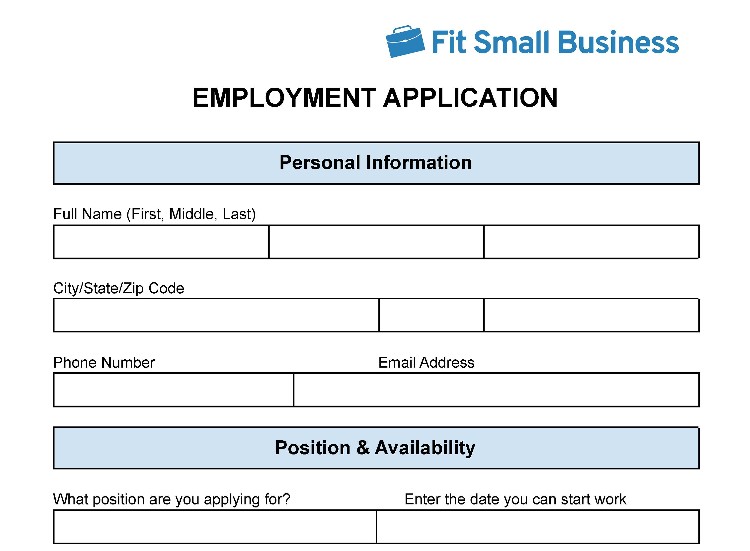
Thank you for downloading!
If you need an easy way to advertise your open jobs, consider ZipRecruiter. Applicants can submit their resumes on multiple platforms—ZipRecruiter posts your position on more than 100 job sites, and it offers daily payment options for users who plan to hire quickly. Sign up to start posting jobs for free.
Employment application forms are essential for any business looking to hire new employees. These generally contain sections for personal and demographic data, as well as work history and qualifications, to help you make the best decision when reviewing candidates.
This article covers what data you should and shouldn’t request for on a job application form, as well as why you should use one in the first place. If you are looking for an easy, ready-to-use template, download and customize our free one above.
What to Include on a Job Application Form
A job application form will generally include information in six key areas: personal information, position and availability, education, employment history, skills and training, and references.
What to Avoid on an Employment Application Form
While you need as much information as possible on an employment application to best understand the candidate, there are certain things you will want to avoid asking for. See our table below for data to avoid and why.
Data to Avoid | Reason |
|---|---|
Marital Status, Salutations | Title VII, Sexism and Gender Discrimination |
Street Address | Title VII, Financial Status and Race |
Social Security Number or Tax Status | Privacy and Data Security |
Race, Gender, and Age | Title VII and ADEA |
Military Dates or Discharge Reasons | Title VII, HIPAA, and ADEA |
Date of Birth | Title VII and ADEA |
Graduation Dates | Title VII and ADEA |
Citizenship and Visa Status | Title VII and Ethnicity |
Reasons for Termination From a Prior Job, Arrest Record, References or Prior Salary | Title VII, HIPAA, Wage Discrimination, and Legal Issues Like Libel |
Requesting information like that in the table above can put your company at risk. It may be a violation of federal labor laws, anti-discrimination laws (like the Title VII of the Civil Rights Act of 1964), age discrimination laws (like the Age Discrimination in Employment Act of 1967 (ADEA)), or Health Insurance Portability and Accountability Act of 1996 (HIPAA) laws, which protect a person’s confidential health-related information.
Why You Should Use a Job Application Form
Seeing a quick overview of relevant information for your applicant is a solid way to understand their qualifications and track them for a complete interview process. Here are the main reasons job application forms are important:
- Organization: Keeping candidate applications is a great way not to lose contact information or misplace info, which can happen when jobs are discussed in person or over the phone. A job application gives you this information in written form to access quickly and easily. It also can be digitally saved and stored online or in a file.
- Tracking: By keeping forms for each applicant and analyzing overall numbers, you can better understand the effectiveness of your company’s recruiting. In addition, if you add a question about where the applicant heard about the position, you can determine which marketing strategy to use moving forward.
- Comparison: By having all applicants complete the same form, you are effectively able to fairly compare applicants to each other on their skills and qualifications for the job posting.
Although a resume or curriculum vitae (CV) has most of the information included in an employment application, it is still a good idea to have both on file. A resume is not a legal document, whereas a job application that provides an EEOC and legal statement can reduce your liability.
Resume vs Application Form: When to Use Either or Both
Resumes and employment application forms serve different purposes and are needed in different situations during the hiring process. When to use each document or when to request both depends on your specific needs and preferences as an employer:
Requesting both a resume and an employment application form can be a reasonable practice in many situations, as it allows employers to collect comprehensive information and maintain compliance. However, when considering the candidate experience, employers should ensure that applicants understand why both documents are requested and how they contribute to the evaluation process.
Bottom Line
An employment application can be a very effective tool when advertising open jobs and growing your business successfully. The work history and qualification information will help you make a hiring decision. This is especially true for jobs that require extensive experience or training. The personal information will help you comply with many federal, state, and local regulations for the candidates you intend to hire.
If you want assistance in finding applicants, ZipRecruiter can help; it even enables you to customize the questions you need from applicants in your application.